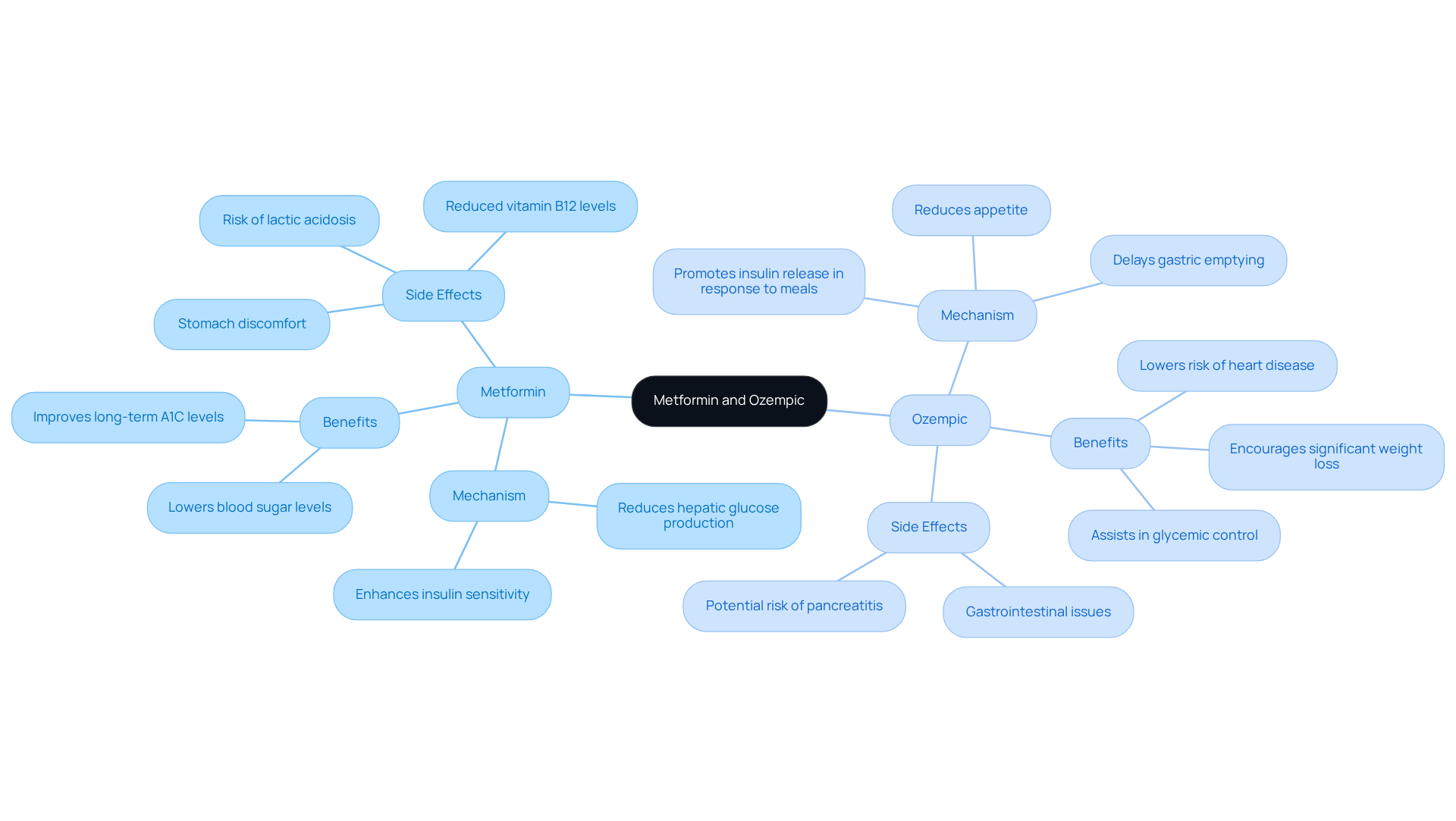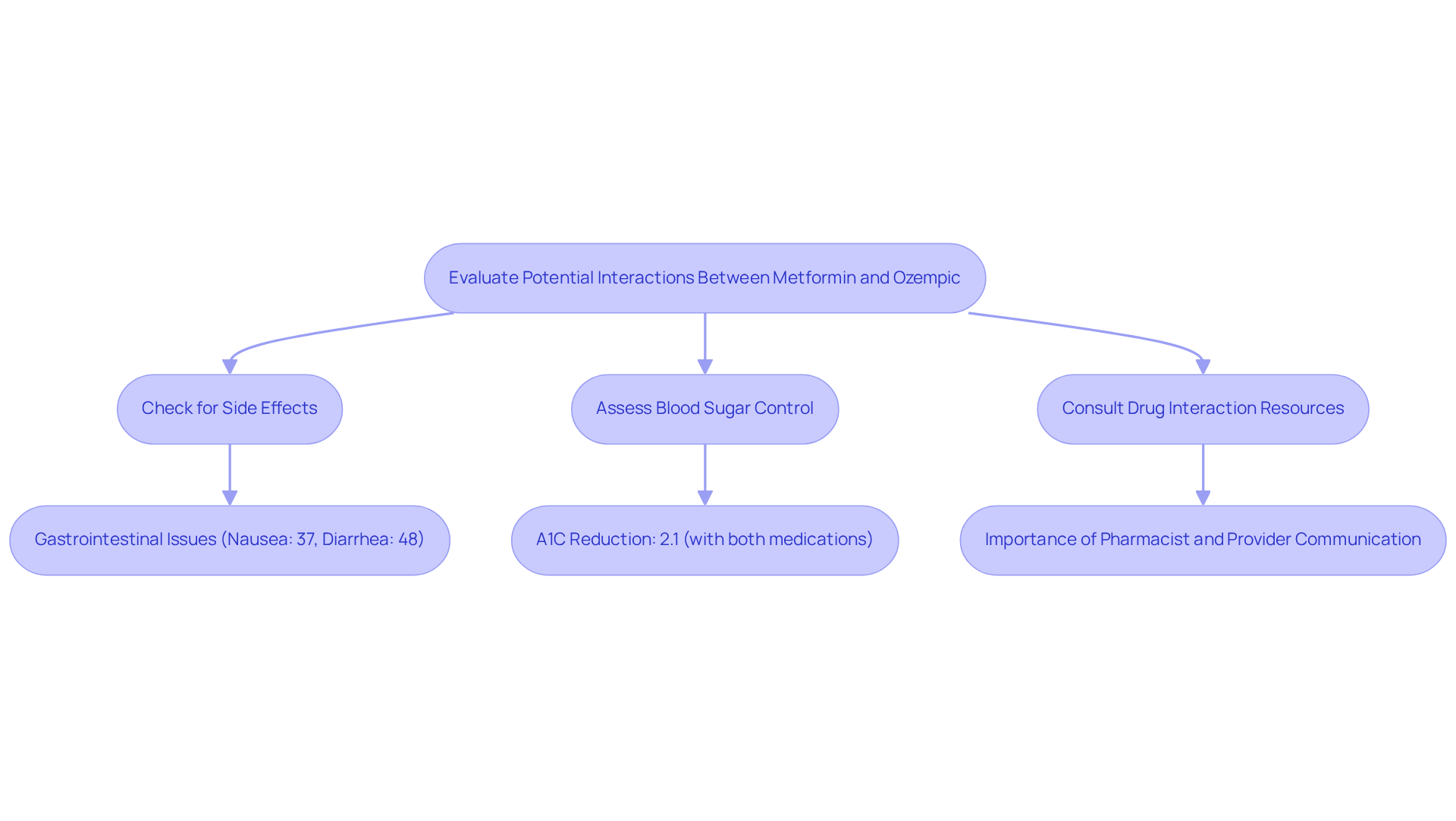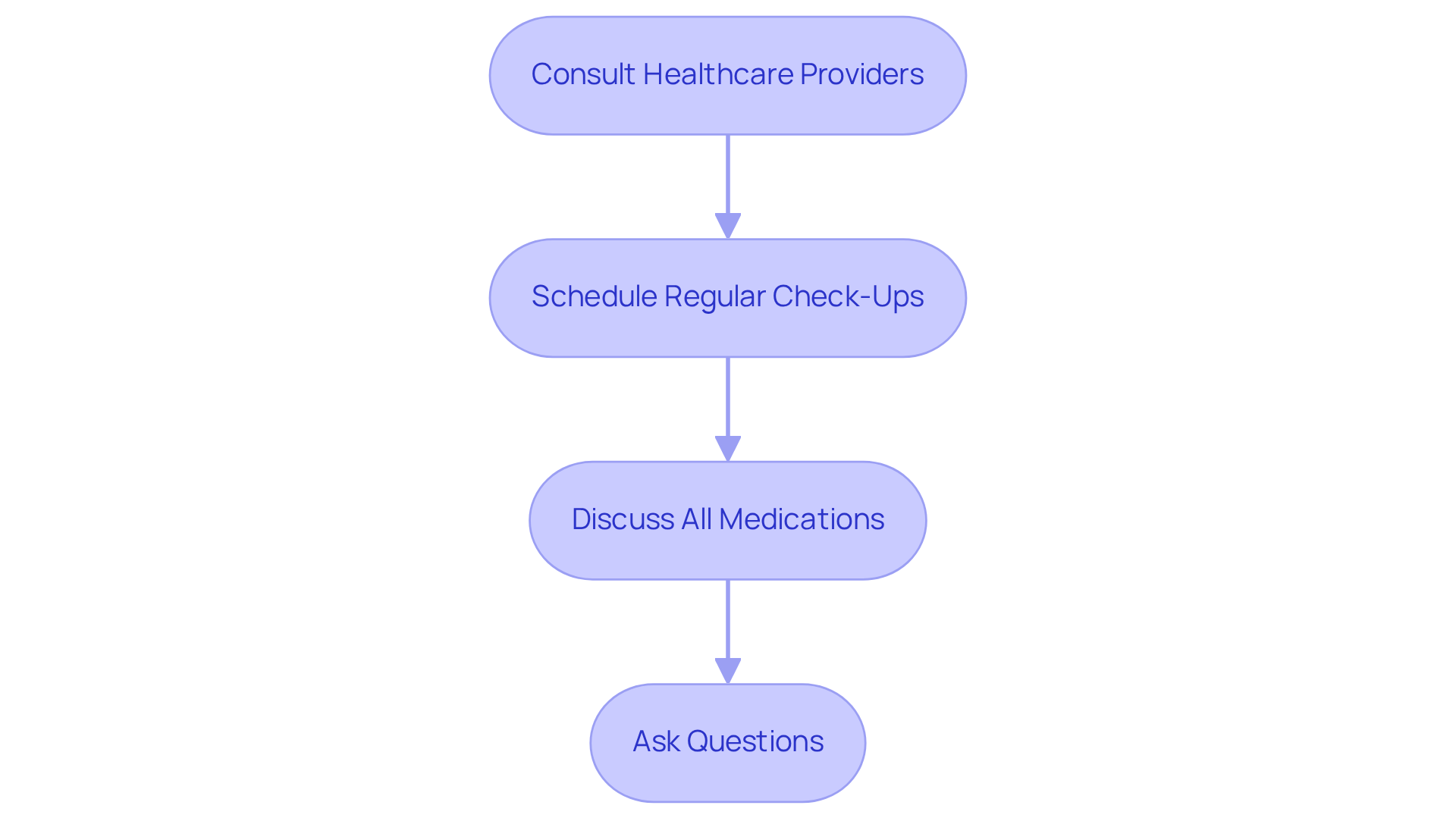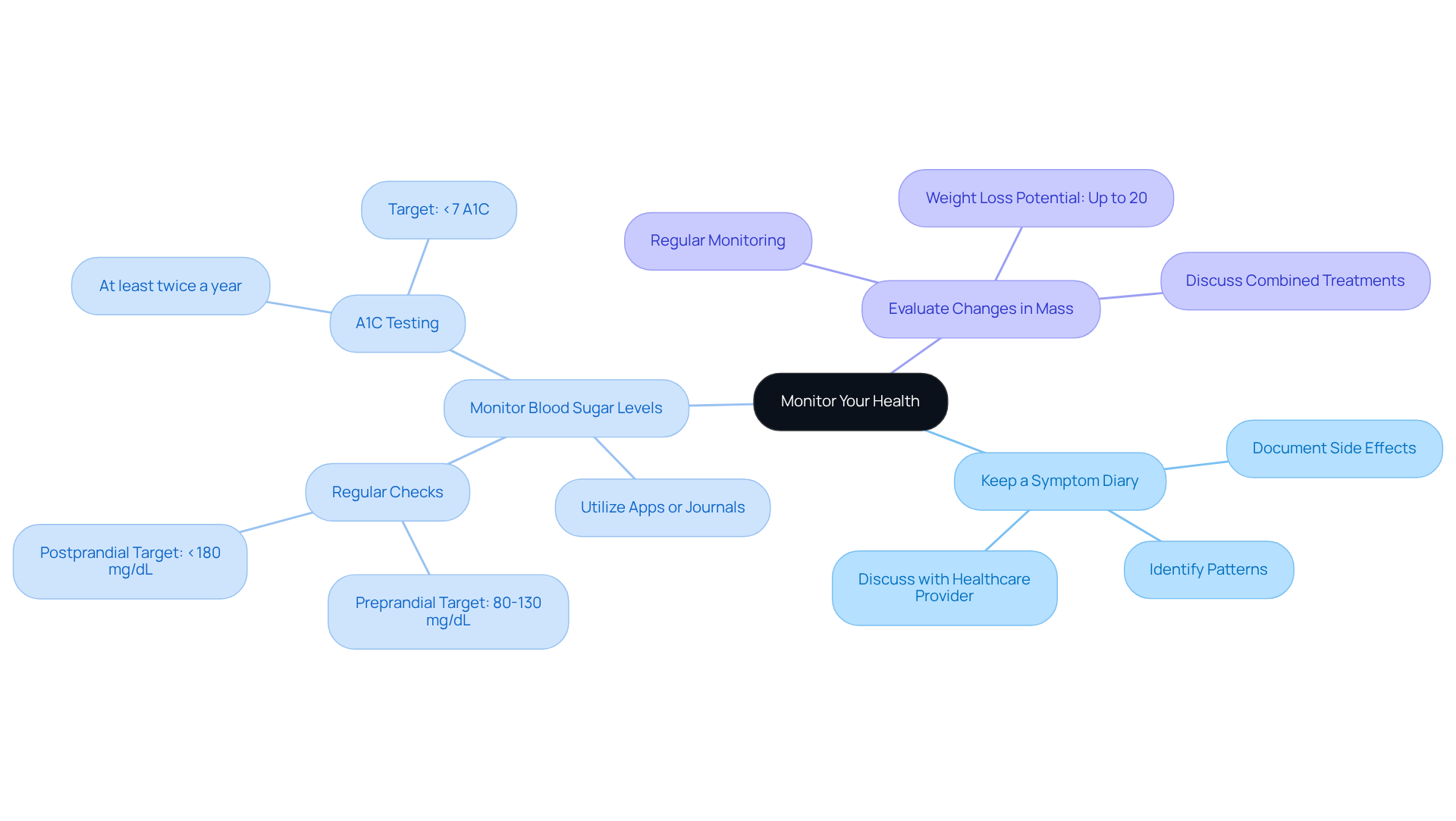Overview
Are you feeling overwhelmed by your weight loss journey? It’s important to know that you’re not alone in this. The article explores the possibility of taking Metformin and Ozempic together, and it concludes that their combination can actually enhance glycemic control and support weight loss for those living with type 2 diabetes. Imagine the relief of improved A1C levels and significant weight loss—this is backed by studies that show these benefits.
However, we understand that safety is a concern. That’s why it’s crucial to monitor for potential side effects and to consult your healthcare provider for personalized guidance. Together, we can achieve your goals, and your health journey can be a shared experience with your medical team. Remember, you deserve support every step of the way.
Introduction
Navigating the complexities of diabetes management can feel overwhelming, especially when it comes to balancing medications. If you’re considering the combination of Metformin and Ozempic, you’re not alone. These two medications each offer unique benefits:
- Metformin enhances insulin sensitivity and lowers blood sugar.
- Ozempic promotes weight loss and improves glycemic control.
But you might be wondering—can these powerful medications be safely taken together?
This article is here to help you explore the potential interactions, benefits, and necessary precautions for those looking to optimize their diabetes treatment plan. Together, we can ensure you make informed decisions about your health journey, empowering you to take the next steps with confidence.
Understand Metformin and Ozempic: Mechanisms and Uses
Metformin is a cornerstone in managing type 2 diabetes, primarily working by reducing hepatic glucose production and enhancing insulin sensitivity. This dual action helps lower blood sugar levels effectively and improves long-term A1C levels, contributing to better glucose control. Have you ever wondered how medications can support your journey? In contrast, semaglutide, a GLP-1 receptor agonist, promotes insulin release in response to meals, reduces appetite, and postpones gastric emptying. This mechanism not only assists in glycemic control but also encourages significant weight loss and lowers the risk of heart disease. It can be a valuable choice for those aiming to manage both diabetes and obesity.
For individuals with type 2 diabetes seeking improved glycemic control and support for managing their body mass, a common question is, can you take Metformin and Ozempic together? Recent studies indicate that patients using Ozempic can achieve an average weight loss of 15% of their body weight while also experiencing better blood sugar levels. The question of can you take Metformin and Ozempic highlights the synergy between the two drugs, allowing for a more comprehensive approach to treatment that addresses both metabolic and weight-related challenges. Together, we can achieve your goals.
Endocrinologists emphasize the importance of understanding the specific indications for each medication. They observe that while one medication is often the primary treatment, another option can be introduced for those who need extra assistance. This tailored approach ensures that individuals receive the most effective treatment plan suited to their unique health needs. However, it’s essential to consider potential side effects, such as:
- Stomach discomfort
- Reduced vitamin B12 levels
- The rare risk of lactic acidosis
By being informed, you can ensure safety and wellness throughout your treatment process. Remember, we’re here for you every step of the way.
Evaluate Potential Interactions Between Metformin and Ozempic
- Check for Side Effects: It’s important to be aware that both medications raise the question, can you take metformin and ozempic, as they can lead to gastrointestinal issues, such as nausea and diarrhea. When considering if can you take metformin and ozempic together, the likelihood of experiencing these side effects may increase. Research indicates that over 48% of individuals using the medication encounter at least one side effect, with nausea affecting nearly 37% of users. We encourage you to monitor the severity of these symptoms and communicate with your healthcare provider to adjust treatment as necessary.
When considering blood sugar levels, many wonder can you take metformin and ozempic together, as this combination has shown promising results in enhancing blood sugar control. Recent studies reveal an average A1C reduction of 2.1% when using both substances together, compared to 1.6% with Ozempic alone. However, we want to emphasize the importance of careful monitoring to prevent hypoglycemia, especially for those who are considering if they can you take metformin and ozempic, particularly those with a history of low blood sugar episodes. Your health and safety are our top priorities.
- Consult Drug Interaction Resources: To ensure the safe use of these medications, we recommend utilizing reliable drug interaction checkers or consulting with a pharmacist. They can provide valuable insights into potential risks associated with the combination, including the need for dosage adjustments or monitoring for adverse effects. Remember, regular communication with your healthcare providers is essential to effectively manage any unusual symptoms. Together, we can navigate this journey towards better health.
Consult Healthcare Providers: Importance of Professional Guidance
-
Schedule Regular Check-Ups: Regular appointments with your healthcare provider are essential for monitoring your progress and adjusting dosages as needed. These check-ups help ensure that your treatment plan remains effective and safe.
-
Discuss All Medications: It’s crucial to inform your provider about every medication you are taking, including over-the-counter drugs and supplements. This clarity enables a thorough evaluation of possible interactions, ensuring your safety while using these medications.
-
Ask Questions: Don’t hesitate to voice any concerns about can you take metformin and ozempic. Ask about potential side effects, required lifestyle changes, and how these treatments can collaborate to manage your diabetes effectively.
Maintaining an open line of communication with your healthcare team is vital for the successful management of your health. Have you ever felt overwhelmed by your treatment options? Research indicates that patients who actively communicate with their providers regarding their treatments achieve better results, including enhanced weight loss and diabetes management. For instance, a cohort study indicated that patients receiving professional guidance achieved significant fat loss, with many losing over 10% of their body mass within six months. Significantly, 90 percent of patients reduced at least 10 percent of their body mass, highlighting the efficacy of expert advice in handling treatments such as Metformin and Ozempic.
This serves as a reminder of the importance of consulting healthcare providers when considering if you can take metformin and ozempic along with these medications. They can offer tailored advice and support throughout your treatment journey. Together, we can achieve your goals. Additionally, incorporating Minimal’s personalized weight loss solutions can further enhance your approach to managing diabetes and achieving sustainable health improvements.
Monitor Your Health: Track Symptoms and Progress
Keep a Symptom Diary: Document any side effects or changes in your health status to discuss with your healthcare provider during appointments. This practice not only helps in identifying patterns but also aids in making informed adjustments to your treatment plan. Given that this medication can cause side effects such as stomach discomfort, nausea, or even a metallic taste in the mouth, tracking these symptoms is crucial for effective management. Remember, we’re here for you in this journey.
Monitor Blood Sugar Levels: Regularly check your blood glucose levels as advised by your healthcare provider to ensure they remain within target ranges. For most individuals with diabetes, the recommended preprandial plasma glucose target is between 80-130 mg/dL, while postprandial levels should be below 180 mg/dL. Consistent monitoring can significantly enhance your diabetes management and help you achieve your health goals. Additionally, A1C levels should be tested at least twice a year to assess long-term glucose control. The medication’s capacity to reduce blood sugar levels and enhance insulin sensitivity plays a crucial role in this process. Together, we can navigate these challenges.
Evaluate Changes in Mass: Monitor your mass regularly to assess the effectiveness of the combined treatment in achieving loss goals. Many clients using this approach have reported losing up to 20% of their weight, which raises the question: can you take metformin and ozempic together to enhance this potential success? Your progress is important, and every step counts.
Tip: Utilize apps or journals to help keep track of your health metrics easily, making it simpler to share this information with your healthcare team during check-ins. Remember, you’re not alone in this; we’re here to support you every step of the way.
Conclusion
The exploration of whether Metformin and Ozempic can be safely taken together highlights the vital importance of a personalized approach to diabetes management. Understanding the mechanisms and benefits of both medications empowers individuals to make informed decisions about their treatment plans. This combination not only strives to improve glycemic control but also addresses weight management, offering a comprehensive strategy for those living with type 2 diabetes.
Key insights from our discussion reveal that while both medications can enhance blood sugar control and promote weight loss, it’s crucial to monitor potential side effects. Regular consultations with healthcare providers are essential for ensuring safety and efficacy, allowing for necessary adjustments in treatment. We encourage patients to actively engage with their healthcare teams, track their health metrics, and communicate any concerns that may arise during their treatment journey.
Ultimately, the combination of Metformin and Ozempic presents a promising option for individuals seeking better management of their diabetes. Emphasizing the significance of professional guidance and personalized care can empower you to achieve your health goals. As the landscape of diabetes treatment evolves, remember that staying informed and proactive is essential for navigating this path to improved health and well-being. Together, we can achieve your goals.
Frequently Asked Questions
What is Metformin and how does it work?
Metformin is a medication used to manage type 2 diabetes. It primarily works by reducing hepatic glucose production and enhancing insulin sensitivity, which helps lower blood sugar levels and improve long-term A1C levels.
What is Ozempic and what are its mechanisms of action?
Ozempic, or semaglutide, is a GLP-1 receptor agonist that promotes insulin release in response to meals, reduces appetite, and delays gastric emptying. This helps with glycemic control, encourages significant weight loss, and lowers the risk of heart disease.
Can Metformin and Ozempic be taken together?
Yes, recent studies indicate that patients using Ozempic can achieve significant weight loss while also experiencing better blood sugar levels. The combination of Metformin and Ozempic can provide a comprehensive approach to managing both diabetes and obesity.
What benefits can be expected from using Ozempic?
Patients using Ozempic can expect an average weight loss of 15% of their body weight along with improved blood sugar control.
What should be considered when using Metformin and Ozempic?
It is important to understand the specific indications for each medication and how they work together. A tailored approach ensures individuals receive the most effective treatment plan suited to their health needs.
What are the potential side effects of Metformin and Ozempic?
Potential side effects include stomach discomfort, reduced vitamin B12 levels, and a rare risk of lactic acidosis.
Why is it important to be informed about these medications?
Being informed about the medications ensures safety and wellness throughout the treatment process, allowing individuals to manage their diabetes and weight effectively.





















